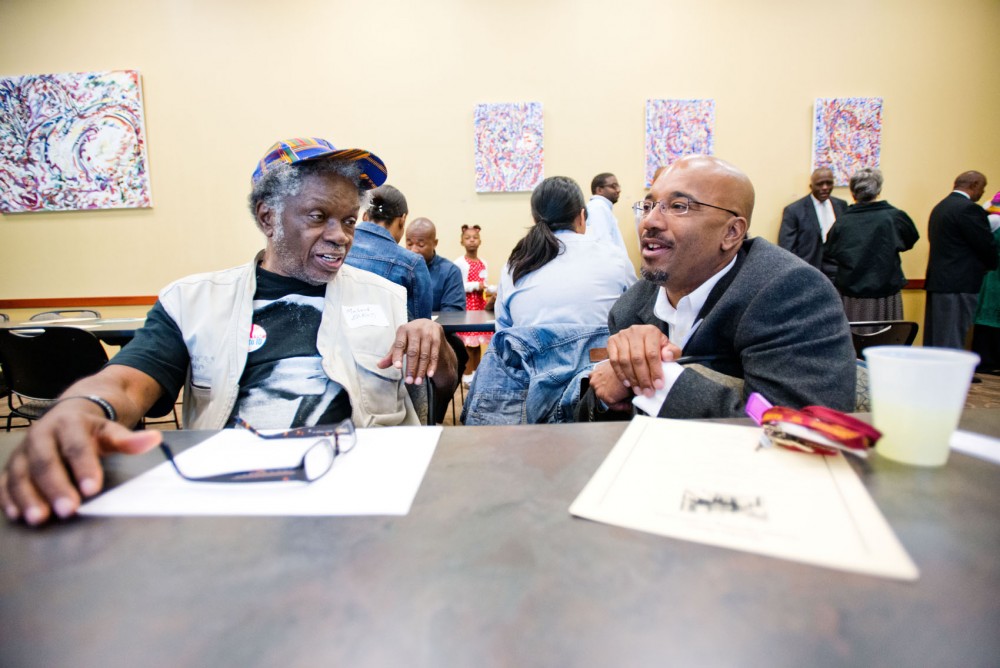African-American student leaders, retired activists and faculty members met Friday to air their hopes for progress at the University of Minnesota.
“The black community is in a very peculiar place today,” said Horace Huntley, the African-American scholar and activist for whom the house is named. “We don’t really know who we are.”
Huntley House for African American Men celebrated its grand opening at the Urban Research and Outreach-Engagement Center on Friday.
The Living Learning Community, based in Sanford Hall, was designed to provide a “stable environment” for male African-American students in their first year at the University. It took on its first four students at the start of the semester.
Participants will receive personal and academic support through regular meetings,
mentorship, curriculum and campus resources, according to Patrick Troup, director of retention initiatives for the University’s Office for Equity and Diversity.
Troup said the house — one of the first of its kind at a large research institution — was created to help combat low graduation, involvement and enrollment rates for African-American men at the University.
Faculty, administrators and students joined former campus activists and community leaders to address fundamental questions of what the LLC stands for and how it might succeed in its mission.
He was one of several speakers at the ceremony.
Soon after Huntley’s speech, Keith Mayes, the new chair of African American and African Studies Department, opened discussion regarding the future of the house to attendees.
“We have to be careful of one thing,” he said, “… that Huntley House doesn’t fail.”
Goalsetting
The six-year graduation rate for black students at the University in 2010 was 45 percent, 25 percent lower than the undergraduate average.
According to a study from the National Center for Education Statistics, the 2010 rate for black men completing bachelor’s degrees in six years was 34 percent — 9 percent lower than black women and 28 percent lower than the white average.
Mayes said Huntley House can address these problems.
Through it, Troup said, he hopes to “set [students] off on the right foot” by giving them the tools they’ll need to be successful in college and beyond.
Residents will meet with peer and staff mentors regularly for casual brown-bag sessions, which Troup expects will help members establish a connection to campus.
They will also be encouraged to engage in on- and off-campus activities and required to enroll in a course titled, “Black Men: Representations and Reality.”
Tutoring will also be available at Appleby Hall, he said.
The struggle
Many in the room spent their college years in the Vietnam era’s explosive climate of social activism.
Manuel Woods, a participant in the 1969 Morrill Hall takeover, said the fact that Huntley House came about without being “pushed” was in itself a mark of progress.
Unlike now, he said, in the 1960s the black community “wasn’t considered an integral part of the University.”
The University only conceded to installing a department for African-American studies after 70 students occupied Morrill Hall.
To some, Huntley House largely stood for the legacy of African-American progress, and at the opening they expressed their belief that if members of the LLC didn’t know their story, it would amount to very little.
But to Simon Ndely, a student organizer, Huntley House is less about conveying the struggle of the past and more about practical issues like retention and student success.
“These are all great points, but how do we get that message to students?” he asked.
Ndely said he called many eligible incoming freshmen to recruit them for the program.
But with only four students joining, compared to the 10 initially planned, he said he doesn’t know if they’ve identified the most effective way to reach black males.
He, along with other student organizers for the house, said the key to its success will be a combination of enthusiasm, personal commitment, outreach and a focus on retaining those already in the LLC.
Great expectations
“I wouldn’t consider myself an activist,” Huntley House member Barflaan Tedoe said. He was, however, stricken by the statements at the ceremony.
“At first I thought it was about academics — now I feel like it’s more about being the best human you can be.”
Kohlman Thompson, another member, had a similar response.
“I knew it was an African-American LLC,” he said. “But this let me know about the struggle.”
Mayes is optimistic that Huntley House will have a lasting impact on African-American student success on campus.
“History will remember the inaugural people [of Huntley House],” he said.


